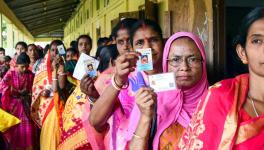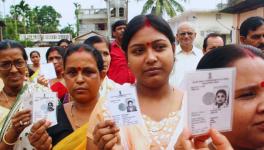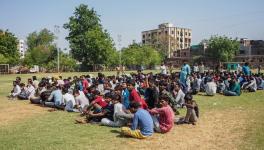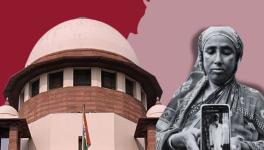Assam: ‘Arbitrary Powers’ to FTs While People Are Set to Face Citizenship Test
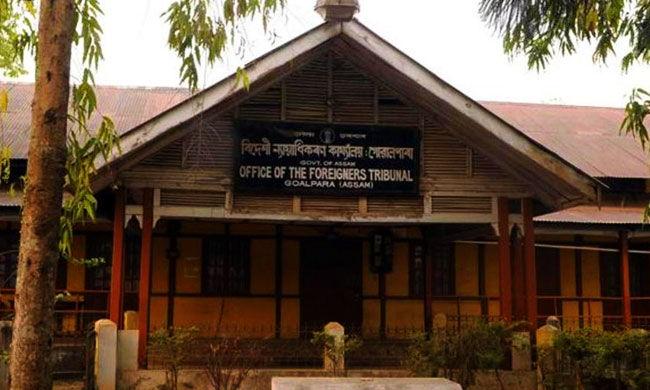
Image Courtesy: Live Law
[This is second part of our three-story series on the constitution, functioning, efficiency and independence of Foreigners Tribunals (FTs) in Assam. This part of the series deals with the Fts’ independence and the “arbitrary powers” that the quasi-judicial bodies have.]
New Delhi: The people who could not make it to the National Register of Citizens (NRC) – which validates legal Indian citizens in Assam – have got 120 days to file an appeal before the Foreigners Tribunals (FTs), quasi-judicial bodies in the state which hold the responsibility to decide the citizenship of applicants.
To deal with the cases of exclusion from the NRC, the government had issued a Gazette notification on May 30, amending the Foreigners (Tribunal) Order, 1964. The new amendment is called Foreigners (Tribunals) Amendment Order, 2019.
Para 3A (6) of the said order states, “In no case, appeal is preferred under paragraph (8) of the Scheduled appended to the Citizenship (Registration of Citizens and Issue of National Identity Cards) Rules, 2003, the district magistrate may refer to the tribunal for its opinion as to whether the person is a foreigner or not within the meaning of the Foreigners Act, 1946 (31 of 1946) in terms of sub-paragraph (1) of the Paragraph 2.”
It is pertinent to note that before the deadline of December 31, 2018, over 2 lakh objections were filed against people who were included in the final draft of NRC. “Almost all objections were filed on the last day of the ‘Claims and Objections’. Before the last day, the number of objections was less than 800,” said Guwahati-based lawyer Aman Wadud.
Also read: How Assam FTs Declare Indians as Foreigners: ‘No Prior Probe, Non-Application of Judicial Mind’
However, many suspect that the actual number of objections was much higher. Objections were filed against a five-year-old child to old and ailing citizens.
“Notices were sent to people against whom objections were filed, including their family members, to depose as witnesses. According to the Standard Operating Procedure (SOP), both objector and objectee should appear in the hearing. But presence of objector is unheard of. Almost in every objection, hearing was decided ex-parte,” he said.
Most people against whom objections were filed have been included in the NRC final list. Paragraph 3 (b) of the Order says, “If an objector does not file an appeal within 120 days, the district magistrate has the opportunity to file a reference against the person who had been objected upon but his name appeared in the NRC because the objection was rejected.
Therefore, even if a person against whom objection was filed and his name is cleared in hearing and included in the final list of the NRC, the district magistrate may again refer to the tribunal for its opinion as to whether the person is a foreigner or not.
“This will start another round of harassment and a never ending process of proving citizenship,” said Wadud.
“Para 3A, Clause 10 of the Order gives arbitrary power to the tribunal. If the tribunal upon production of records by the district magistrate concerned finds merit in the appeal, it may issue a notice for hearing the appeal. It means, the appeal may also be rejected at the threshold by the tribunal without even granting an opportunity for hearing to the appellant,” he said.
“Para 3A, Clause (17) of the Order says the tribunal shall have the power to regulate its own procedure. While other judicial forums are regulated by Civil Procedure Code (CPC) and Code of Criminal Procedure (CrPC), the tribunal – which decides the most important constitutional rights of citizenship – has been given unchecked power to regulate its own procedure. Tribunals often abuse this power. Very often, they don’t issue summons to witnesses, stating that the burden of proof is on the accused. After declaring a person a foreigner, many tribunals don’t provide certified copies of relevant documents required to challenge the FT order. The tribunal acts arbitrarily because they have been given power to regulate its own procedure,” he added.
INDEPENDENCE OF FTs
The members of tribunals are selected by the Gauhati High Court but the appointment is done through Home Political Department of the Government of Assam..
In 2017, 19 members of FTs were terminated for “poor performance”. Some aggrieved members challenged the termination before the High Court. The Principal Secretary of the Government of Assam annexed a copy of performance appraisal of the members. The members who had declared the least percentage of cases as foreigners were recommended for termination. The High Court held that “it will be obligatory for the High court to assess the petitioners in terms of the advertisements dated May 5, 2015, for the purpose of considering as to whether extension should be granted or denied”.
But the assessment report of the government, the appointing authority, shows that it wants more people to be declared as foreigners. Subsequently, there has been a visible change in the functioning of the FTs and the percentage of people being declared as foreigners has increased.
NO APPELLATE BODY
There are no appellate authorities of the Foreigners Tribunals. The order/opinion of the tribunal is to be directly challenged before the Division Bench of the Gauhati High Court.
According to the 7-judge bench of the Supreme Court in L. Chandra Vs Union of India in 1997, all the decisions of tribunals would be subject to scrutiny before the Division Bench of their respective High Courts under Article 226/227.
LIMITED SCOPE UNDER ARTICLE 226/227
While discussing the scope of interference with tribunals’ order in a writ petition, a three-judge bench of the Gauhati High Court in State of Assam Vs Moslem Mondal & Ors in 2013 stated that, “Article 226 of the Constitution confers on the High Court power to issue appropriate writ to any person or authority within its territorial jurisdiction. The tribunals constituted under the 1946 Act read with the 1964 order is required to discharge the quasi-judicial function. The High Court, therefore, has the power under Article 226 of the Constitution to issue writ of certiorari quashing the decision of the tribunals in an appropriate case. The scope of interference with the tribunal’s order, in exercise of the jurisdiction under Article 226, however, is limited.”
Also read: People’s Tribunal Indicts Supreme Court Over NRC in Assam
It further states, “The writ of certiorari can be issued for correcting errors of jurisdiction, as and when the inferior court or tribunal acts without jurisdiction or in excess of it, or fails to exercise it or if such court or tribunals acts illegally in exercise of its undoubted jurisdiction, or when it decides without giving an opportunity to the parties to be heard or violates the principles of natural justice. The certiorari jurisdiction of the writ court being supervisory and not appellate jurisdiction, the court cannot review the findings of facts reached by the inferior court or tribunal. There is, however, an exception to the said general proposition, in as much as, the writ of certiorari can be issued and the decision of tribunal on a finding of fact can be interfered with, if in recording such a finding, the tribunal has acted on evidence, which is legally inadmissible or has refused to admit admissible evidence of if the finding is not supported by any evidence at all, because in such cases, such errors would amount to an error of law apparent on the face of the record. The other errors of the fact, however grave it may be, cannot be corrected by a writ court.”
“As noticed above, the judicial review of the order passed by the inferior court or the tribunal, in exercise of the jurisdiction under Article 226 of the Constitution, is limited to correction of errors apparent on the face of the record, which also takes within its fold a case where a statutory authority exercising its discretionary jurisdiction did not take into consideration a relevant fact or renders its decision on wholly irrelevant facts. Hence, the failure of taking into account the relevant facts or consideration of irrelevant factors, can be a ground for interference of the court or tribunal’s decision in exercise of the writ jurisdiction by the High Court,” the bench said.
MAIN GROUNDS ARE NOT MENTIONED IN FT NOTICES
According to Para 3 (1) of the Foreigners (Tribunal) Order, 1964, “The tribunal shall serve on the person to whom the question relates, a copy of the main grounds on which he is alleged to be a foreigner and give him a reasonable opportunity of making a representation and producing evidence in support of his case and after considering such evidence as may be heard, the tribunal shall submit its opinion to the officer or authority specified in this behalf in the order of reference”.
The 3-judges bench in State of Assam Vs Moslem Mondal & Ors had stated that “the proceedee shall be served with the notice, together with the main grounds on which he is suspected to be a foreigner, as far as practicable, personally, whose signature/thumb impression, as proof of service, is to be obtained”.
The Supreme Court in the Sarbananda Sonowal (II) Vs Union of India in 2007 had stated, “Having regard to the fact that the tribunal in the notice to be sent to the proceedee is required to set out the main ground; evidently the primary onus in relation thereto would be on the state. However, once the tribunal satisfied itself about the existence of grounds, the burden of proof would be upon the proceedee.”
Also read: After Crushing Ordeals, Millions Await Final NRC List in Assam
Despite unambiguous provision and categorical guidelines by the Supreme Court and the Gauhati High Court, Foreigners’ Tribunals with utter disregard to provisions and court guidelines uniformly issues notices to the proceedee (accused) without any ground. Therefore, in absence of any main ground which is akin to plaint of any civil case, the proceedee is not expected to rebut by way of imaginary grounds in the form of written statement. It clearly prejudices the case of the petitioner while submitting the written statement in absence of a clear cut and tangible main grounds.
APPLICATION OF EVIDENCE ACT
The Supreme Court in the Union of India Vs Madras Bar Association in 2010, while discussing difference between court and tribunal, stated inter alia, “While courts are governed by detailed statutory procedural rules, in particular the Code of Civil Procedure and the Indian Evidence Act, requiring an elaborate procedure in decision making, tribunals generally regulate their own procedure applying the provisions of the Code of Civil Procedure only where it is required, and without being restricted by the strict rules of the Evidence Act.”
But FTs selectively apply certain sections of the Evidence Act in a very stringent manner. Documents like village headman certificate, school certificate, nikahnama, village panchayat certificate, etc. are private documents and hence, not admissible if not proved as per Section 61 to Section 65 of the Evidence Act. Many citizens – despite being children of Indian citizens – are mostly being declared foreigners because of such strict application of the Evidence Act.
But Section 50 of the Act is mostly overlooked. It states, “When the court has to inform an opinion as to the relationship of one person to another, the opinion , expressed by conduct, as to the existence of such relationship, or any person who, as a member of the family or otherwise, has special means of knowledge on the subject, is a relevant fact.”
The deposition of family members, parents or siblings, wherein they categorically state that the proceedee is their daughter/sister is rarely taken into consideration. But a minor contradiction in the deposition of family members could prove fatal in proving citizenship.
Get the latest reports & analysis with people's perspective on Protests, movements & deep analytical videos, discussions of the current affairs in your Telegram app. Subscribe to NewsClick's Telegram channel & get Real-Time updates on stories, as they get published on our website.











